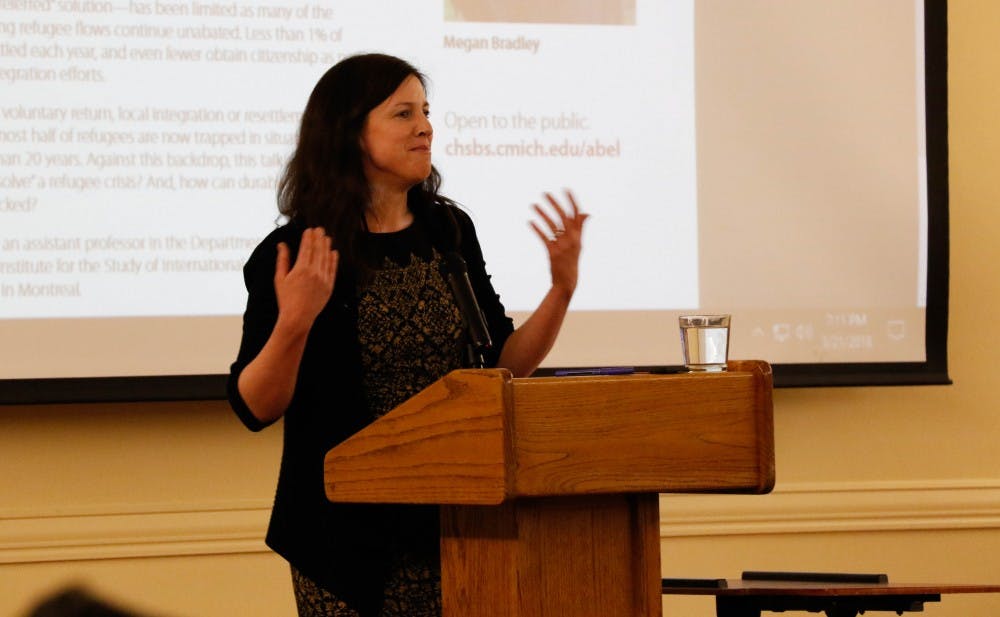Montreal professor Megan Bradley presents solutions to refugee crises

Megan Bradley speaks to CMU students and staff on solutions for refugee crises in Powers Hall Ballroom March 21
Megan Bradley believes there are three types of "durable solutions" for refugees.
Bradley presented "Ending Exile: The Meaning and Making of Solutions to Refugee Crises" on March 21 in the Powers Hall Ballroom — getting students to consider solutions and how the issues came about.
An assistant professor in the Department of Political Science and the Institute for the Study of International Development at McGill University in Montreal, Bradley set her focus on refugees outside of their country of origin — offering three types of solutions that have been popular.
All of these solutions have issues and are a “failing enterprise," Bradley said.
Voluntary repatriation, local integration in host states or resettlement to third countries are the current solutions that refugees face, she said. Voluntary repatriation or the voluntary return of refugees to their home countries is a solution for only 2.5 percent of refugees.
“Refugees can’t count on the states of origins for the protections of their rights,” Bradley said. pointing out a flaw with this type of resettlement.
Elaborating, Bradley said this solution only leaves refugees with “a tarp and a bag of rice” when they arrive home.
“When we talk about refugees and people who are moving from place to place we kind of put them as the ones to blame for these radical measures. Me being in the military, what are we doing over there as soldiers that is not helping the situation,” said Wayne freshman Gabrielle Wren Sledge.
Many refugees say their goal is to return to their country of origin. This solution, Bradley said, is the only one with a clear legal right. Many refugees would rather go home than rebuild their lives in another country.
“I just got off an alternative break where I worked in an international school that houses immigrants and refugees, they are not getting well represented," said Canton senior Brandon Edwards.
The second solution is to integrate them into a bordering country, Bradley said. Unfortunately for refugees, less than one percent can get citizenship in that country. Without citizenship, those refugees have no guarantee on their rights. Even worse, the paths to those countries can be deadly.
“People do share information, if we think about the Syrian crisis, people will be texting back and fourth to family members what the best route is,” Bradley said. “That is an important part of how refugees deal with the risks of those trips.”
The solution a lot of refugees have hope for is going to a third country, Bradley said. Only about 1 percent of refugees leave their limbo of displacement this way.
“I think what she said about all solutions not working for every situation is extremely true,” Taylor freshman Hanna Muntz said. “Every situation is different.”
While new fixes are promising, Bradley stressed that quick fixes are not the answer.
One way to address this issues that Bradley touched on is to address the limbo refugees can exist in. Improving the quality of life during this time could be a way to enhance the lives of refugees. A big part of this solution is to guarantee rights. This can range from giving refugees the ability to work, marry and have kids.
These fixes require states to be proactive and to be dedicated to the solution, Bradley said.



